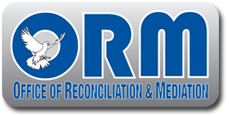Office of Reconciliation Ministries: from Ireland to the Orient
Office of Reconciliation Ministries: from Ireland to the Orient |
|
 PASADENA—The year 2002 concluded with a whirl of activities for ORM (Office of Reconciliation Ministries) overseas efforts. Curtis May, ORM director, and his wife, Jannice, conferred with ministers, lay members and workshop attendees in Northern Ireland and Scotland in September; conducted reconciliation conferences in London, England, and Cork, Ireland, in October; conducted interdenominational meetings in Bacolod, Philippines, in November; and enjoyed a one-day visiting and conferring session with a pastoral family in Tokyo, Japan. Here are the highlights of this worldwide effort. Northern Ireland: Mr. May spoke to WCG members in Belfast, Sept. 21. Mr. May left the audience “speechless,” according to Jim Herst, ORM chapter leader. His topic? The racial insensitivities that plagued the WCG and other Christian groups. It was an education, some parishioners commented afterward. Stephen Cave, general secretary of the Evangelical Alliance of Northern Ireland, shared his understanding of the need for reconciliation. ORM met with Paul Redfern, a Church of Ireland priest, and his wife, Betty. Their church is located in Belfast, where the Redferns are trying to work with both Catholics and Protestants in this troubled city. After viewing ORM’s flagship video, Reconciliation—A Move of God, Betty said: “That was great. I wish that everyone could see it!” Paul gave a powerful message during that service to WCG members, encouraging everyone through Jeremiah 29:11: “For I know the plans I have for you,” declares the Lord, “plans to prosper you and not to harm you, plans to give you hope and a future.” On a tour of the Catholic areas of Belfast, Dr. Herst and Mr. May noticed murals depicting scenes of the U.S. Civil Rights movement of the 1950s and 1960s. Catholics identify with the African-American struggle. They find hope in it. Mr. May, who grew up in segregated Alabama, was pleased to note how the struggle for civil rights in America has cast such a long shadow. Edinburgh and Perth, Scotland: Mr. May was pleasantly surprised to meet Peter Sheppard, a WCG member whose father was a leader in the British Israel World Federation, a group with theories about the alleged privileged origins of the Anglo-Saxon people. ORM meetings quite often deflect British-Israel teaching, so the experience of bridge-building between two such groups struck a soft note in what could have been a hard-edged exchange. Peter mentioned that in his father’s experience with British-Israelism, more emphasis was placed on prophecy than race as one would find in America. Even the emphasis on prophecy was flawed. Another Scotsman Mr. May met related an experience he had when he was around 12 years old. He said he asked a Catholic woman if he could escort her 12-year-old daughter to a school activity. She retorted: “I will not let my daughter go out with a dog! I would slit your throat.” He was Protestant. This incident helps illustrate how walls and broken relationships are built and perpetuated. In Perth, a Canadian woman was greatly moved by the message on how Christian groups subtly perpetuate embedded racist stereotypes. “I had no idea,” she told Mr. May through streaming tears. London, England: Chapter leader Olivier Carion of the North London church organized a workshop where the theme of forgiveness emerged clearly and loudly. “This was the first round two workshop for ORM in any city,” Mr. May said, “so the atmosphere was forward-looking with a broader use of the Scriptures on this vital subject.” One health care counselor who attended the meeting praised the ORM approach: “We are doing the same type of work as you are—helping people heal.” Cork, Ireland: Mr. May was joined by chapter leader Evelyn O’Callaghan in Cork, where a pleasant small group atmosphere prevailed. “Evelyn gave an outstanding message on forgiveness, which has to be part of any workshop we do in the future,” Mr. May said. One Christian woman gave ORM what she felt was a word from the Lord. It was from Isaiah 54:17: “No weapon forged against you will prevail, and you will refute every tongue that accuses you.” This was a welcome bit of Irish plain-speaking. Bacolod, Philippines: After addressing the WCG congregation in Metro Manila, Mr. May traveled to Bacolod accompanied by Pastor George Escara, area superintendent. “The Bacolod group was interdenominational,” Mr. May said. “There were Baptists, Pentecostals, Christian Reformed and others.” The group viewed three videos on reconciliation issues followed by small group discussions. “The feedback was lively and humorous,” Mr. May said, notwithstanding the seriousness of the subject matter. Following is a sample of the feedback we received: “It’s really good! Reconciliation is needed and starts with individuals coming to God. Then it will flow to our family and church. We are ambassadors of reconciliation. Very good indeed is the seminar!” (Pastor Rolly Pondia—Sanctuary in the City Church) “Reconciliation ministry is much needed here in Bacolod with 36 denominations and a history of church splits. The lecture is a challenge for us to implement it. It must be offered to a larger body.” (Leah Aguirre—missionary) “It’s edifying because it builds bonding in our relationships as Christians and understanding of God’s will regarding acceptance of one another regardless of differences. “One of our friends in another church, upon hearing positive comments about the lecture and workshop, inquired if you’re still in Bacolod so they can invite you to speak in their church.” (Pastor Leonor De La Cruz—Mount Olives Ministry Faith) Tokyo, Japan: At the request of WCG Philippine national leaders, the Mays spent a day with Shunsuke Nakagawa, a pastoral team member, and his wife, Shizuko, and their three children. The WCG congregation in Japan is made up of mostly expatriate Westerners and Mr. Nakagawa is himself a former Lutheran minister now serving the WCG in Japan. This was a small but refreshing reminder of one of ORM’s major themes: interdenominationalism. |
|
